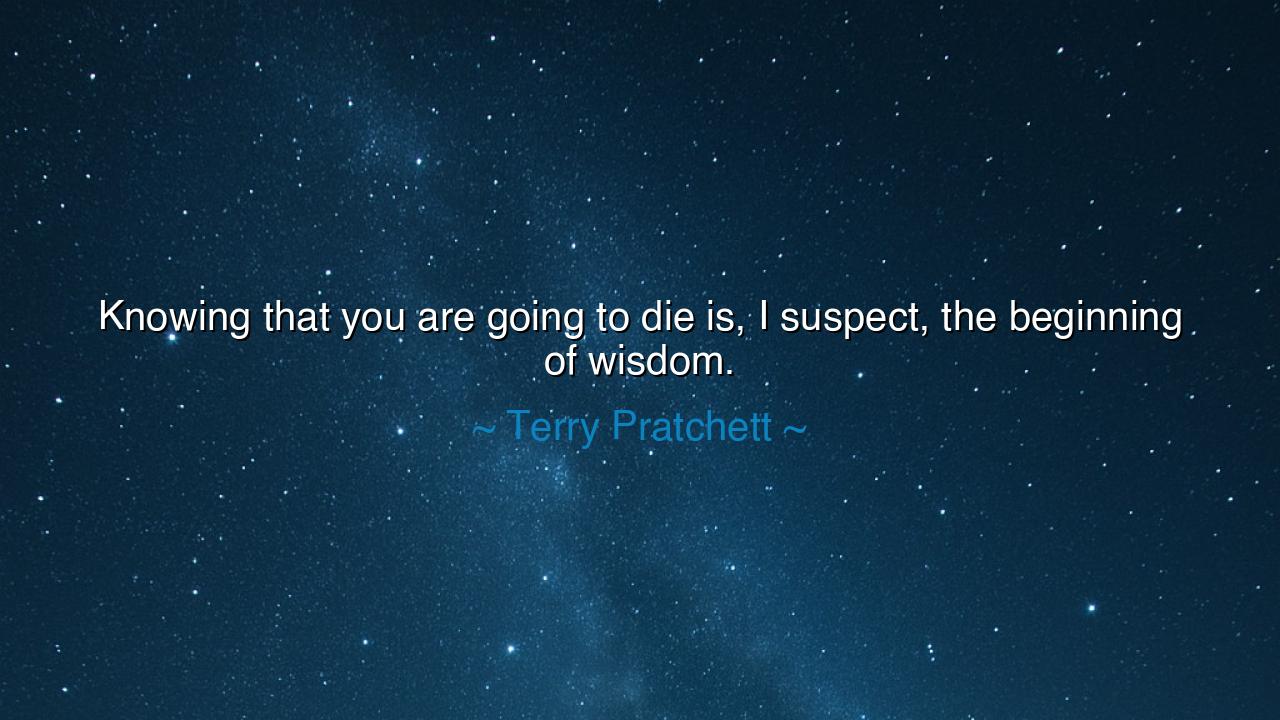
Knowing that you are going to die is, I suspect, the beginning






Terry Pratchett, with the wit of a sage cloaked in humor, whispers a truth as old as breath itself: knowing that you are going to die is the first step toward wisdom. For until man faces the certainty of his end, he stumbles through life as though immortal, wasting hours, clinging to vanity, and mistaking shadows for substance. But when the veil is torn and death is seen not as distant, but as certain, then the soul awakens. To know one’s end is to begin to live with clarity.
The ancients proclaimed this same truth. Socrates, awaiting the cup of hemlock, taught that philosophy is nothing but preparation for death. In the face of mortality, he shed all fear and met his end with serenity. This was not despair, but liberation; for he understood that the finiteness of life is what gives weight to every choice, every word, every breath. So too does Pratchett remind us: only when death is acknowledged does life gain its true measure.
History resounds with this wisdom in the story of Marcus Aurelius, emperor and philosopher. In his Meditations, he wrote daily of death, not as horror, but as guide. “You could leave life right now,” he told himself, “let that determine what you do, say, and think.” By embracing mortality, he ruled with restraint, compassion, and perspective. His greatness was not only in armies and decrees, but in the humility that death taught him.
Consider also the tale of Joan of Arc. A young girl, she knew from visions and fate that her life would burn quickly, like a candle in the wind. Yet because she embraced her mortality, she lived with fiery courage, accomplishing in a few short years what others could not in a lifetime. Her death did not diminish her power; it magnified it, for she had lived every moment as though it might be her last.
Let the generations remember: to deny death is to live as a fool, but to accept it is to step into wisdom. For the shadow of the grave is not meant to paralyze, but to awaken. It teaches urgency, humility, gratitude, and courage. The man who knows he must die begins, at last, to truly live; for he treasures the fleeting, honors the present, and spends his days not as a miser of hours, but as a steward of eternity.






TAThe Anh
This idea intrigues me because it frames mortality not as a limitation but as a teacher. I wonder whether wisdom is more about embracing impermanence than accumulating knowledge or achievements. Could this awareness guide ethical decision-making, empathy, and creativity? At the same time, I question whether constant focus on death might overwhelm some people, suggesting that part of the journey toward wisdom involves learning to hold this awareness lightly, integrating it without letting it dominate one’s life.
KQKim Quynh
Reading this provokes reflection on how people relate to time and legacy. Does understanding the brevity of life make one more patient, compassionate, or strategic in pursuing meaningful goals? It also makes me wonder about the balance between urgency and acceptance—how does one act decisively while acknowledging the inevitability of death, without succumbing to recklessness or fear? Perhaps this tension is at the heart of what Pratchett considers the beginning of wisdom.
TTHoang Thi Thanh Thuy
I find this perspective both comforting and motivating. Accepting that life is finite might help people make better decisions and focus on what truly matters. But I also worry about how individuals who resist this idea navigate life—are they at a disadvantage in cultivating wisdom? It raises the question of whether wisdom is inherently linked to confronting existential truths or whether it can emerge through other experiences and insights.
QAhoang quoc anh
This quote makes me curious about the connection between mortality and personal growth. If knowing we will die is the seed of wisdom, does it suggest that fear and acceptance are key teachers? I also wonder about cultural differences—do some societies instill this awareness in ways that encourage deeper insight, while others avoid it, potentially delaying the development of wisdom? How might meditation or reflection on mortality serve as practical tools for living more wisely?
TNtu nguyen
I feel a mixture of awe and anxiety reading this. It implies that much of human folly comes from ignoring the inevitability of death. Could this awareness encourage people to prioritize what truly matters—relationships, creativity, and meaning—over trivial pursuits? At the same time, I question whether this approach could backfire, leading some to nihilism or despair if the awareness of mortality is not balanced with purpose and hope.